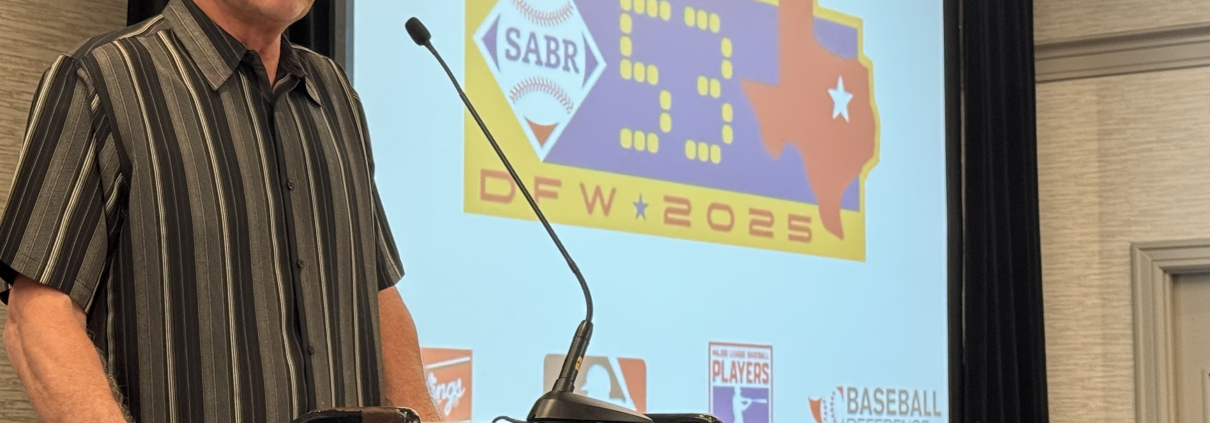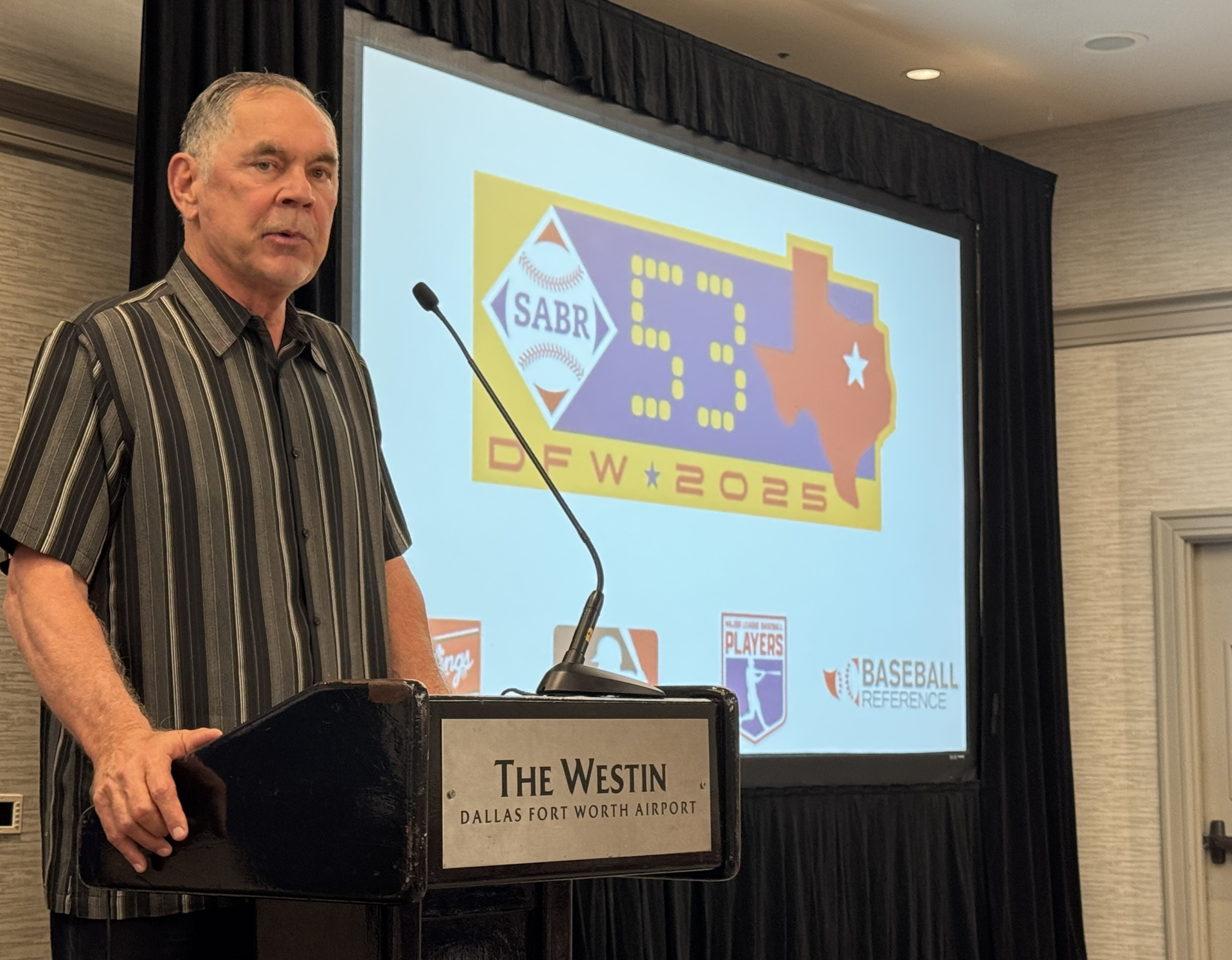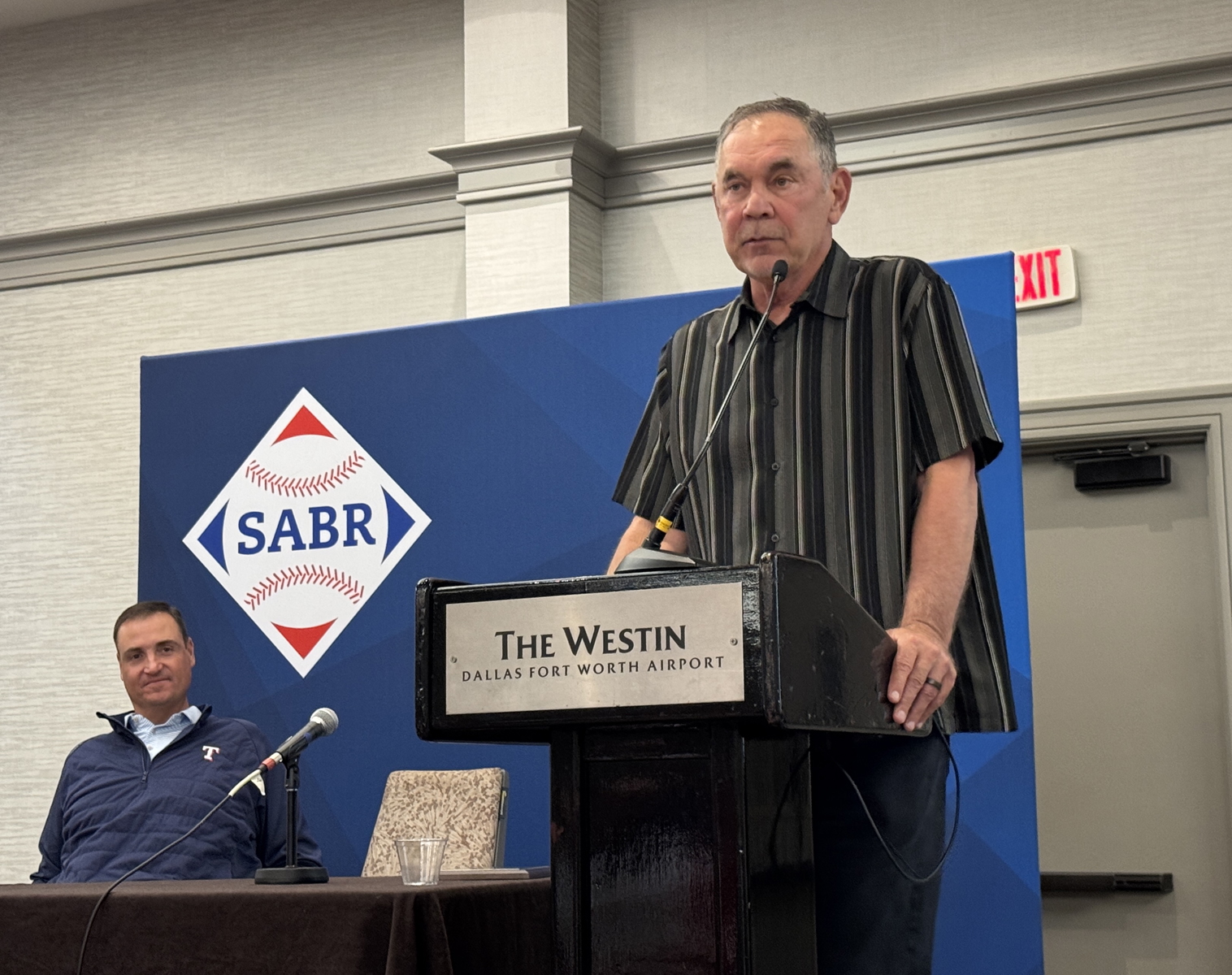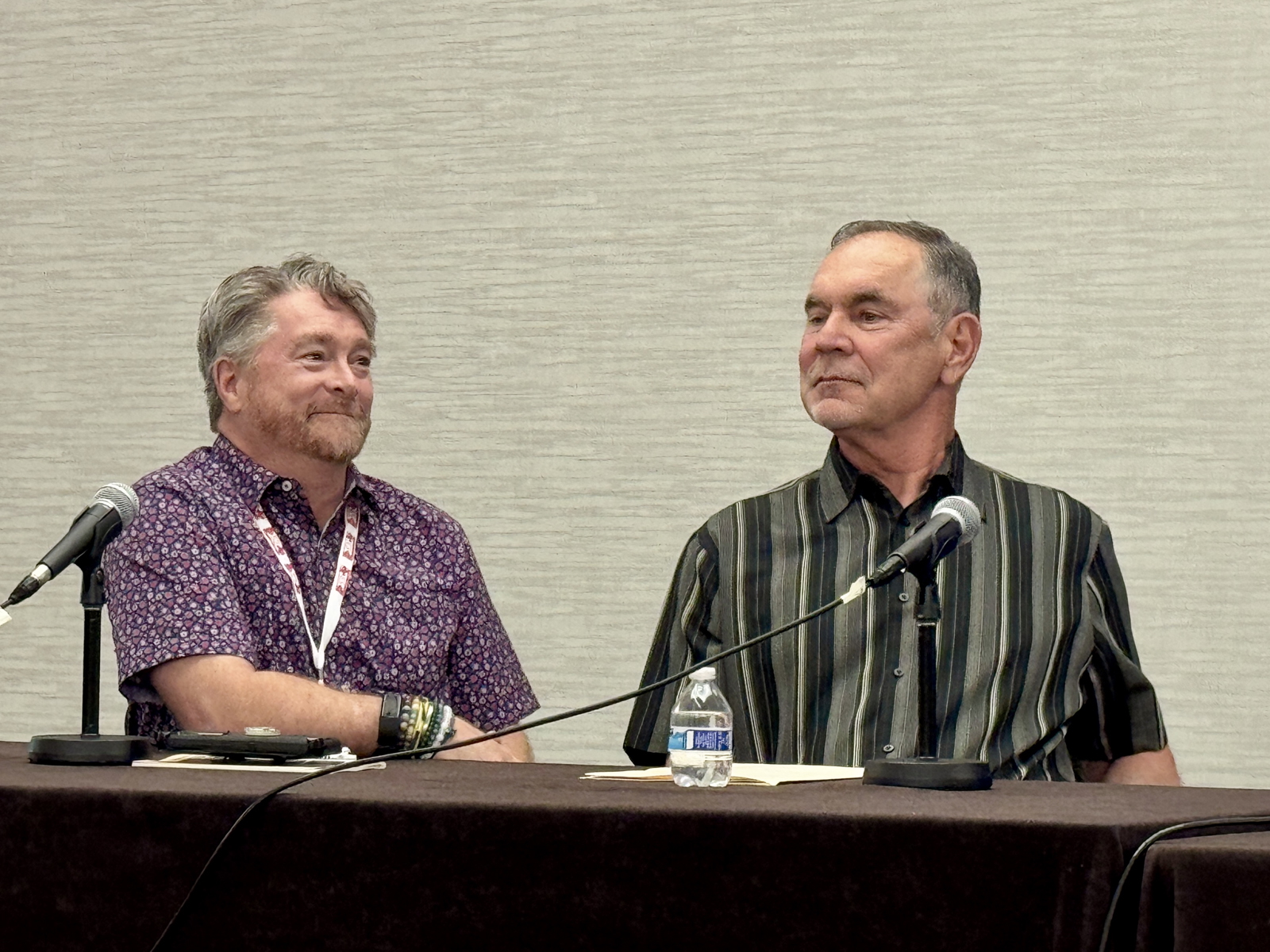SABR 53: Listen to highlights from Bruce Bochy’s Roland Hemond Award presentation
On June 26, 2025, Texas Rangers manager Bruce Bochy was honored at SABR 53 at the Westin DFW Airport Hotel in Irving, Texas, with the Roland Hemond Award, which recognizes a baseball executive who has demonstrated a lifetime commitment to professional baseball scouts and scouting, and player development history. He was introduced by SABR Board President Dan Evans and Rangers President of Baseball Operations Chris Young. Listen to audio highlights or read a transcript of Bochy’s remarks below.
- Listen: Click here to listen to Bruce Bochy’s remarks during the Roland Hemond Award presentation at SABR 53 (MP3; 22:26)
Thank you, C-Y, for those remarks. They told me this award was for a lifetime of service. Well, that’s baseball’s polite way of saying you’re old — but we like you. I’ve been thrown out of more games than I care to admit. But I’m getting honored here today for sticking around. So thank you.
It’s an honor to be with all of you tonight. I’ve had the privilege of managing three incredible clubs, San Diego, San Francisco, and here with Texas. Some of the greatest lessons I’ve learned throughout my career weren’t just in the dugout. They were from men and women who found the players, who saw the potential, who believed in a young kid throwing about 88 (mph) at a high school that nobody else showed up to see.
I watched my brother, who was a career scout, travel the countless miles, the sketchy hotels, the bad coffee, but a guy who was in love with the hunt. Joe could recognize talent, but more importantly, he could see the heart behind the people. I’ve never forgotten how important scouts are, these lifetime scouts who allow us to do what we do. Now my son, Brett, who just finished his first career year as a professional scout. I’ve stood in awe at how seriously he’s taken his job.
We’re in the limelight, but we’re standing on the shoulders of countless men and women who are behind the scenes making it possible for us to do what we do.
Yesterday, we’re standing around the clubhouse and guys are asking what my plans are on my day off. I said, “Well, I’m going to the SABR convention.” Not many of them knew what it was. One guy was kidding around and asked, “Is it sandwiches and baseball?” I said, “No, it stands for people who know more about your career than you do.”
SABR is baseball’s conscience and compass. To be among the people who love the game as much as I do, it really is an honor for me. I look back and see what you do to help shape it, to study it, to preserve it, thank you for that. Hopefully when I say I’m honored to be here, you know I am sincere.
I’m up here in a little disbelief. You never set out on a journey thinking you’re going to get a lifetime award. You set out because you love the game and you want to give it everything you’ve got. To be associated with the name Roland Hemond, that’s pretty incredible for me. This award carries special meaning to me because Roland Hemond wasn’t just a legend, he was a listener. He listened to the scouts, to his field people, to old-timers with the wisdom, and to the young guys with hope.
Most importantly, Roland lifted up the people behind the curtain who built this game up and kept promoting them. Roland was the kind of guy, he treated interns and All-Stars the same, with the same kindness.
The reason I know this is because I had a chance to spend a lot of time with Roland, at the winter meetings, at All-Star Games, and of course when he was with Arizona (Diamondbacks). Every time I was there, he would come down and talk … about everything. He just had a heart for people. He saw things in people that others missed. He was kind, he was generous, and he had a memory that would put most of us to shame. He remembered your story, not just your stats. He remembered your name, your wife’s name. He wasn’t just a builder of rosters, he was a builder of relationships. He made the game personal.
His mentorship, he never hoarded wisdom. He handed it out. He was a builder of scouts and coaches, and players of the game. His stewardship of the game, he reminded us all that this game was a gift. He believed the game didn’t belong to any of us, it belonged to all of us.
If we’re honest with each other, we’re all drinking from wells dug by others. I didn’t have the kind of career I’ve had because I had this figured out. I’ve had great players, loyal coaches, front offices that trusted the process. I’ve had mentors like Bobby Cox, Joe Torre, Felipe Alou, and people like Roland Hemond, who poured into me.
I’m going to tell you what baseball has given me. If there’s anything I’ve learned in this game, baseball will give you a platform. It’s up to you to make it matter.
Today, I’d like to touch briefly on three intangibles that this game has given to me. These are things you’re not going to see on the stat sheet or at a press conference. These are things I’ll carry with me long after the last out.
Baseball will humble you fast. Success is fleeting, but criticism is free. One day you’re a genius, and the next day you’re a bum.
It’s taken me a while to figure this out. But this game has taught me to stay grounded, not to get too high or too low. We play this game for the fans. We play this game for the soldier who may be on leave who wants to see his favorite team. We play for the families who may not be able to afford a vacation but they can afford to come to the ballpark. We play for the mom or dad who may be dealing with battling cancer but just wants another great evening at the ballpark. I try to remind myself of who we’re playing for, and that’s how I keep things in perspective.
Resilience. Sometimes we don’t talk enough about how hard this game is. The grind is real. The losses are heavy. The travel is endless. The losing streaks, the doubters. The silence in the dugout when that momentum is changed. I can tell you that, a couple of days ago, when we had a four-run lead and four batters later, we’re down 5-4.
But that’s when you find out what you’re about. The game toughens it. And if you let it, it’ll soften you. It makes you more compassionate. Because you know every guy in that clubhouse has a story. And part of my job is to make sure they know they matter, even if they’re 0-for-20.
The beauty of the game is that every day, there’s another chance to get it right. To show up and do better. And that’s what I love about scouting. There’s always another player, another unknown, with big-league dreams.
Some of my deepest friendships I’ve made are from this game. And not just players or coaches. I’m talking trainers, scouts, clubhouse guys, grounds crew, bus drivers, guys who all become like family to you. In my case, some actually are family.
You win with them, you lose with them. You grind out 162 games. And if you’re fortunate, you get to play a few in October. You fight, you laugh, you grow old together. And if you do it right, you lift each other up and you make each other better along the way.
People often ask me what is the secret to winning. There’s no secret. There’s just showing up, day after day, and paying attention. Trusting your people, listening more than you talk, giving credit, taking the blame. And never forgetting where you’re from or forgetting those who believed in you before you believed in yourself.
That’s why I love that this award bears Roland Hemond’s name — because that’s the kind of man he was.
I’ve been called a players’ manager, an old-school manager, a calming presence in the lineup. And that’s fine. But the truth is, inspired by how Roland lived his life, I just wanted to be someone worthy of this jersey, someone who tried to leave the game a little bit better than how he found it.
So let me wrap this up by saying thank you. Thank you to SABR for keeping stories alive, the stats, the legends, the untold contributions of scouts and player development people who shape these players before a single highlight reel ever existed.
The award may have my name on it, but I share it with every scout who sat in a cold bleacher with a stopwatch and a dream, who bet on a young kid who didn’t have that perfect swing or those clean mechanics, but had a deep passion for playing the game right. And I share it with everyone in player development, who saw a spark in a player where others saw a flaw. And with every person who has given their life, not just to the game, but for the game. You are the backbone of this thing we call baseball.
And I have to share it with someone else, my wife Kim, a special lady who has been in my life since almost my career started. … I have to tell you a little bit about her. We got married in 1978. We had a little apartment in Cocoa, Florida. I didn’t make the Triple-A team, I ended up going to Columbus, Georgia, and playing in the Southern League.
In July of that year, I got called up to the major leagues, which she still takes credit for, believe me. (Houston Astros manager) Bill Virdon called me and said, “You’re here for 10 days, don’t bring your family out here.” About three weeks go by, I’m catching every day, I go in to Bill and ask, “Is it OK if I bring my wife out here?” He says sure. We’re on the road, so Kim and my sister Terry drove to Houston from Columbus the night before. They got there to the hotel across the road from the Astrodome and our traveling secretary didn’t have a room set up for her. So my wife and Terry spent the night in the car. Welcome to the big leagues!
Four months later, I got her in Venezuela playing winter ball and I still see her sitting on the floor, there’s this little frying pan in this little motel room we had. That’s how we had dinner every night. It had this concoction on the shower, you had to stand on a rubber mat to get hot water, or you would get electrocuted.
Through the bumpy rides on our journey, including four more years of winter ball, never one complaint. She was along the ride. I can’t thank her enough for her support and for her sacrifice, for allowing me to do what I loved to do. So thank you, Kim.
And lastly, this story is about two guys who loved the game, Frank and Joe. They played baseball throughout their life, Little League, Babe Ruth, high school. They weren’t good enough to play professionally, so they kept playing in these different leagues according to their age. And they’re playing in the over-70 senior league. They’re having coffee one day and one of them says, “I wonder if there’s baseball in heaven. We gotta make a deal that if one of us goes first, somehow, some way, we gotta let the other one know.” Frank passed away first and Joe continues to play. He’s sitting in the dugout one game, it’s about the fifth inning, and suddenly he sees this bright light. Joe hears his name and says, “Frank, is that you? Is there baseball in heaven?” And Frank says, “Yeah, I got good news and bad news. The good news is, I’m playing with Ted Williams and Mickey Mantle and all the greats. It’s incredible.” And Joe says, “Well, what could be bad?” And Frank says, “Well, I see you’re scheduled to pitch here on Tuesday.”
I don’t know who’s pitching on Tuesday. That’s up to the good Lord. But before that time comes, as long as I’m able, I will do what I can to contribute to this game that I love, this game that has done so much for me. Thank you again for honoring me. This is a very special award.
Originally published: July 2, 2025. Last Updated: July 2, 2025.





